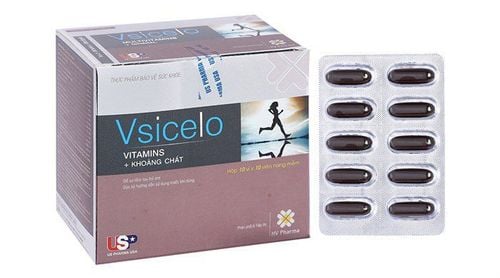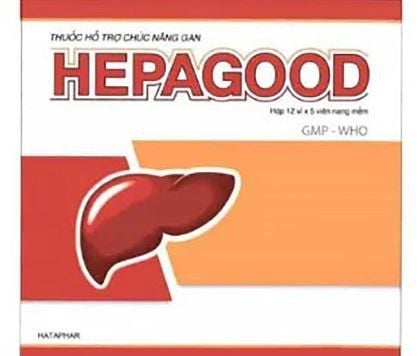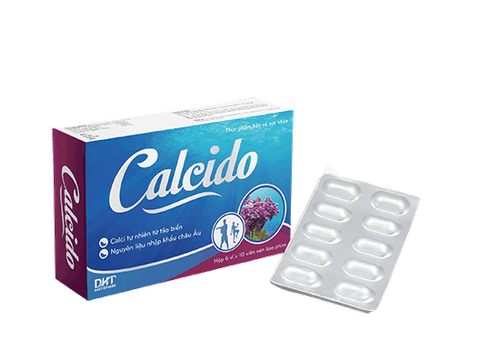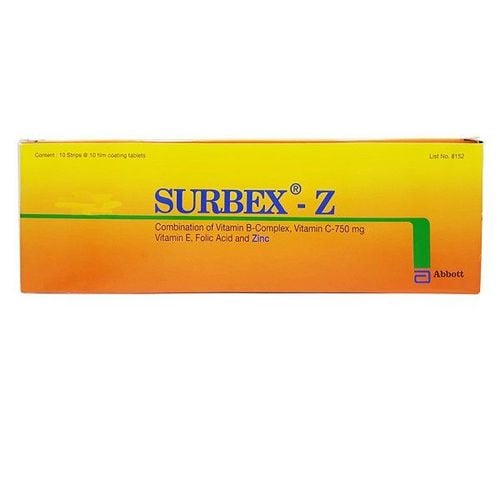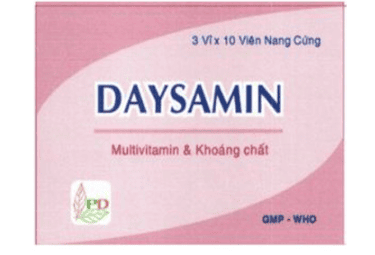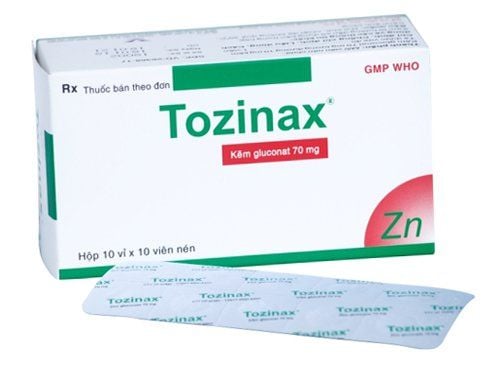This is an automatically translated article.
Atisyrup Zinc is considered an effective zinc supplement therapy for cases of zinc deficiency due to burns, vomiting, acute or chronic diarrhea,... To use Atisyrup Zinc safely and early to achieve effective results Patients need to follow all recommendations on dosage as well as the way to take the medicine that the doctor has prescribed.
1. What is Atisyrup Zinc?
Atisyrup Zinc belongs to the group of minerals and vitamins, often used to supplement zinc for patients with zinc deficiency. In addition, Atisyrup Zinc is also used for cases of malabsorption syndrome, zinc loss due to vomiting, diarrhea, protein loss or burns,...
Atisyrup Zinc is produced in the form of a syrup. Each bottle of Atisyrup Zinc syrup contains 100ml. Each 5ml of Atisyrup Zinc syrup contains zinc in the form of Zinc Sulfate heptahydrate with a strength of 10mg and other excipients attached.
2. What does Atisyrup Zinc do?
2.1 Uses of Zinc Sulfate Heptahydrate Zinc Sulfate heptahydrate is an essential trace element of the body, involved in the synthesis of proteins, nucleic acids, glucid and enzyme systems such as Dehydrogenase or Carbonic anhydrase. In addition, zinc sulfate heptahydrate is also present in tissue structure, helping to keep tissues intact.
When the body is deficient in zinc, it will lead to skin damage, hair loss, diarrhea, increased sensitivity, growth retardation, infection, impaired tissue division such as skin, immune system or intestinal mucosa. The most typical manifestation of zinc deficiency is chronic diarrhea. Prolonged diarrhea can lead to severe zinc deficiency. Therefore, the supplementation of zinc to reduce the duration and intensity of diarrhea for patients with zinc deficiency with Atisyrup Zinc is the recommended therapy by doctors.
2.2 Indications for use Atisyrup Zinc Syrup Atisyrup Zinc is commonly used to treat the following cases:
Combination treatment of acute and chronic diarrhea with electrolyte and water replacement solutions. Treatment and prevention of zinc deficiency conditions in children with malnutrition, rickets, digestive disorders, growth retardation, anorexia, sleep problems, night crying, recurrent infections of the respiratory tract, skin, and digestive tract , keratosis pilaris, dry skin, baldness, nail dystrophy, dry eyes, slow wound healing, night blindness or corneal ulceration. Supplementing zinc for patients with a zinc-deficient diet, while helping to increase resistance to make the body healthier. Zinc supplementation for pregnant women with morning sickness, nursing mothers or those who have to long-term parenteral nutrition. 2.3 Contraindications to the use of Atisyrup Zinc Syrup Atisyrup Zinc should not be used in the following cases without the prescription of a specialist:
Patients with hypersensitivity or history of allergy to zinc sulfate heptahydrate or any other drug. any excipients in the drug. The patient has renal failure. People who have had kidney stones. The patient is copper deficient.
3. Dosage and instructions on how to use Atisyrup Zinc effectively
3.1 Dosage of Atisyrup Zinc The following is a therapeutic dose of Atisyrup Zinc medicine according to the general recommendation of the doctor:
Dose for children with anorexia, fussiness, eating less and prone to infections: Oral from 1-2 ml / day, equivalent to half a teaspoon and continuous treatment within 2-3 months. Dose for children with zinc loss due to diarrhea, vomiting,...: Children under 6 months should take 5ml/day, divided into 3 times/day. Children over 6 months old should drink about 10ml / day, equivalent to 2 teaspoons and divided into 2-3 times / day, used within 10-14 days. 3.2 Instructions for taking Atisyrup Zinc correctly Atisyrup Zinc is prepared in the form of a syrup, so patients should take it by mouth about 1-2 hours after a meal. Before giving to children, the dose should be diluted with water about 2-3 times.
Atisyrup Zinc should be used intermittently instead of continuously for too long. After a course of medication, the patient should take a break for about 1 month before continuing to use it.
3.3 How to deal with an overdose of Atisyrup Zinc An overdose of Atisyrup Zinc can cause gastric erosion, gastritis or oral mucosa. More seriously, the patient may develop gastric ulcer leading to perforation. In addition, long-term excessive intake of zinc can lead to copper deficiency, anemia caused by red blood cells or neutropenia. At this time, the patient needs to use chelation drugs to push zinc in the serum.
In case of taking an overdose of Atisyrup Zinc and experiencing serious symptoms, the patient should be treated with supportive measures quickly. However, in case of an overdose of Atisyrup Zinc, measures such as induction of vomiting and gastric lavage should be avoided. It is best to use a soothing agent such as milk, alkaline carbonate, complexing agent or activated charcoal.
4. Atisyrup Zinc side effects
Atisyrup Zinc may cause some of the following adverse effects for patients during use, including:
Abdominal pain. Undigested. Gastritis. Stomach irritation. Diarrhea . Nausea or vomiting. Dizzy. Headache. Irritability. Listless. Patients should tell their doctor immediately if any of these symptoms occur after taking Atisyrup Zinc. Early detection and treatment of Atisyrup Zinc side effects will help prevent the progression of other serious health risks.
5. Notes when using and interacting with Atisyrup Zinc
5.1 What should be noted when treating with Atisyrup Zinc? In the process of using Atisyrup Zinc supplements, patients need to be careful with some of the following:
Abuse of Atisyrup Zinc can cause zinc accumulation and lead to kidney failure. Caution should be exercised when administering Atisyrup Zinc to patients on a sodium-controlled diet due to its presence in the drug. Atisyrup Zinc should not be used in patients with fructose intolerance, glucose-galactose malabsorption and sucrose-isomaltase enzyme deficiency. Possible reactions by the yellow excipient Tartrazin in the drug Atisyrup Zinc Research shows that zinc can cross the placenta and it is not known whether taking Atisyrup Zinc is really safe for pregnant women. Ideally, pregnant women should only use Atisyrup Zinc when prescribed by a doctor. Atisyrup Zinc can be excreted in breast milk, so nursing mothers should only use the drug when there are specific indications. 5.2 What other drugs does Atisyrup Zinc interact with? Some drugs can interact with Atisyrup Zinc, including: Quinolone, Tetracycline, Tretine, Penicillamine and copper antibiotics may increase the risk of copper deficiency with long-term treatment or use. high doses along with zinc. Concomitant use of calcium salts with Atisyrup Zinc may decrease zinc absorption. Delay the absorption of zinc when taking Atisyrup Zinc with other foods such as bread, boiled eggs, coffee. This is because the fiber and phytate in these foods bind to zinc, which in turn prevents zinc from being absorbed into the intestines. To ensure safety and prevent the risk of interaction between Atisyrup Zinc with other drugs, you need to tell your doctor a list of drugs or supplements you are using for specific advice. In addition, in addition to the above information, if you have any questions, you should directly discuss with your doctor for timely advice.
Please dial HOTLINE for more information or register for an appointment HERE. Download MyVinmec app to make appointments faster and to manage your bookings easily.




